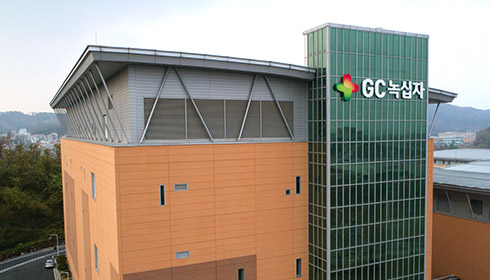GC Pharma refuted a lawmaker’s claim that the company had given up developing Covid-19 plasma therapy, saying the allegation was far from the truth.
The company on Friday said it would apply for conditional approval for its plasma therapy candidate GC5131. “We plan to apply for conditional approval today, as scheduled,” an official at GC Pharma said.
The company will submit phase-2a clinical data to the Ministry of Food and Drug Safety for a conditional permit.

GC Pharma admitted that the company’s agreement with the Korean Red Cross for cooperation for the supply of donated plasma has recently expired. However, it was not true that the company had given up the drug development, the company said.
Earlier, independent lawmaker Jeon Bong-min, who is a member of the National Assembly’s Health and Welfare Committee, said GC Pharma almost gave up the development of the plasma therapy, citing the end of the agreement between the company and the Korean Red Cross for the supply of plasma donated by Covid-19 survivors.
However, GC Pharma said it ended the agreement because it secured plasma sufficiently.
GC Pharma’s investigational treatment is an “anti-SARS-CoV2 hyperimmune immunoglobulin” made by dividing up only immune proteins with various antibodies taken from the plasma of recovered COVID-19 patients.
The company initially collected plasma from four hospitals – Korea University Ansan Hospital, Kyungpook National University Hospital, Daegu Fatima Hospital, and Keimyung University Dongsan Hospital.
Since August, however, GC Pharma has been collecting more plasma from 46 blood donation centers across the nation through cooperation with the Korean Red Cross.
As of March 10, 6,645 people registered for plasma donation, and 4,205 have finished the donation.
“We have secured all the stocks necessary for winning approval for therapeutic purposes,” an official at GC Pharma said. “Even when we go on with the phase-3 trial later, the current production is sufficient.”
GC Pharma was mindful of the lawmaker Jeon’s interpretation of the termination of the plasma supply agreement as giving up a phase-3 study. However, the company still has to work on plasma shortages for clinical trials and treatment.
GC Pharma completed producing the third batch of plasma therapy in November and did not proceed with additional production. The company used 240 liters of plasma for the third batch.
On March 26, the Korea Disease Control and Prevention Agency said in a briefing that it was fundamentally difficult to mass-produce plasma therapy.
“Locally available plasma therapy can treat fewer than 400 Covid-19 patients,” the KDCA said.

